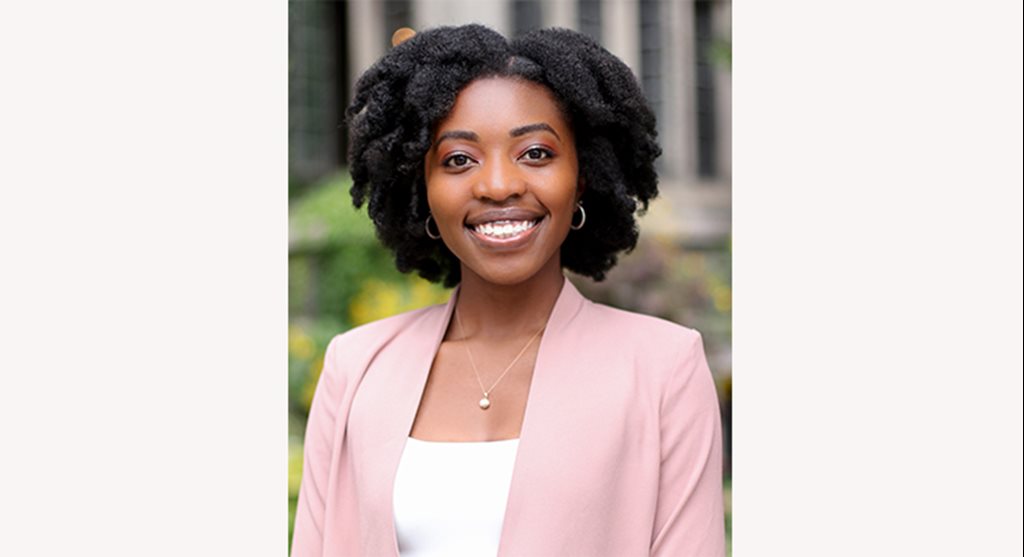
By: Stuart Foxman
When Chika Stacy Oriuwa was named the 2020 valedictorian for the University of Toronto’s Faculty of Medicine, she knew she wanted to talk about identity and purpose.
“The key message I was trying to get across was the importance of defining yourself, before you let other people inaccurately define you, and getting a sense of your internal convictions. Allow that to be the compass that guides you,” says Dr. Oriuwa.
She was the first woman to become valedictorian in 14 years, and the first Black woman to be sole valedictorian. “Surreal,” is how she describes the opportunity.
In July, Dr. Oriuwa started her residency in psychiatry, and is doing research in clinical neuropsychiatry.
“I chose it because I found that intersection to be one of the most fascinating and least understood areas of medicine. Because it’s not understood, it tends to be quite disabling, and treatment options are often more limited.”
Dr. Oriuwa is the daughter of Nigerian immigrants. Her mother was a Personal Support Worker, and her father a manager in the pharmaceutical field and a part-time nurse in long-term care. “My mom says that as soon as I started to talk I wanted to be a doctor,” she says.
MD is only one of the labels that Dr. Oriuwa embraces. Her Twitter bio refers to her as also a writer, public speaker and advocate, and she is a poet too. In fact, she performed a poem called “Skin” – what she calls a eulogy, a protest, and an act of solidarity and resistance – at her medical school interview.
“I think it enriches the educational experience when students are exposed to more diverse narratives, perspectives and lived experiences.”
She was excited about attending University of Toronto. U of T is not only a prestigious medical school, it is also situated in the most diverse city in Canada. Moreover, the school has a Black Medical Students’ Association.
“I was looking forward to finding a shared solidarity,” she says.
When she arrived, Dr. Oriuwa saw that she was the only Black medical student in her class. One out of 259. “I was disillusioned. It was hard to process,” she says.
There were other Black students in the year ahead of her and, eventually, behind her. “But in my year it was isolation and an ‘othering’ feeling.”
More diverse cohorts can transform medical school, says Dr. Oriuwa. For one, it could help to drive more and deeper conversations around inequities in health care, and the impact on racialized communities.
“I think it enriches the educational experience when students are exposed to more diverse narratives, perspectives and lived experiences. That enables everyone’s medical education to be more fulsome,” Dr. Oriuwa says.
Passion for advocacy
The numbers showed that Dr. Oriuwa was a rarity in medical school. Others didn’t let her forget it.
When she was featured in a Toronto Star article about how the university aimed to attract more Black students, someone on social media mocked the effort and said “What are they teaching over at U of T? African bush medicine?” Another commenter on Facebook said “She should be smart enough to know Black people are intellectually inferior and thus are less likely to get into medical school, do your research!”
Those were strangers, emboldened by anonymity. Yet Dr. Oriuwa recalls other incidents. Like the patient in a hospital who doubted that she was meant to be there, and questioned if Dr. Oriuwa really was part of the medical class. Or another patient who yanked on her shirt and asked her to start cleaning floors, assuming the she was part of the custodial staff.
After Dr. Oriuwa was named valedictorian, she was targeted with several racist comments online, with people saying the honour was undeserved, and that they’d never let her treat them.
These weren’t isolated events. Too often, she says, experiences of racism aren’t shared because of a fear of being seen as someone who is “creating issues”. Being a physician allots certain privileges, Dr. Oriuwa says, but there’s no immunity to anti-Black racism.
She says she wants to be an advocate. That has many dimensions – an advocate for her patients day-to-day, for her community, and for growing the body of knowledge around Black health, Black mental health and racialized medicine.
Dr. Oriuwa has a voice, and has used it in media interviews, seminars and panel discussions. She was co-president of the Black Medical Students’ Association of U of T, and co-founder of the Black Interprofessional Students Association of U of T. She also co-founded the group Black Girl Brunch Toronto.
“I recognized a real need to make empowerment spaces accessible for racialized woman. This has been a passion project of mine,” she says.
Medicine is an art as well as a science, and Dr. Oriuwa sees a connection too between being a poet and a doctor. She says she’s accustomed to having conversations that are emotional and evocative.
“Performance poetry requires you to be unflinching in the face of life’s most difficult topics,” she says. “It necessitates being able to transcend the barriers of communications to resonate with a broad audience. I think being able to view the world through a poetic lens lends itself well to a career in medicine.”
In her valedictory address, Dr. Oriuwa also talked about what makes a great doctor. “As physicians we are asked to make sense of our patients’ stories. We are asked to make sense of the difficulty in our patients’ lives. We are in essence sense-makers. But what do we do when it stops making sense? When the patient who has been stable for years relapses. When the psychosis returns. Or when the cancer metastasizes. What do we do when things don’t go as planned?”
“In these moments,” she shared, “we should remember that the most important skill we possess is not our ability to make sense of things, but our ability to connect, remain human and bring comfort.”












